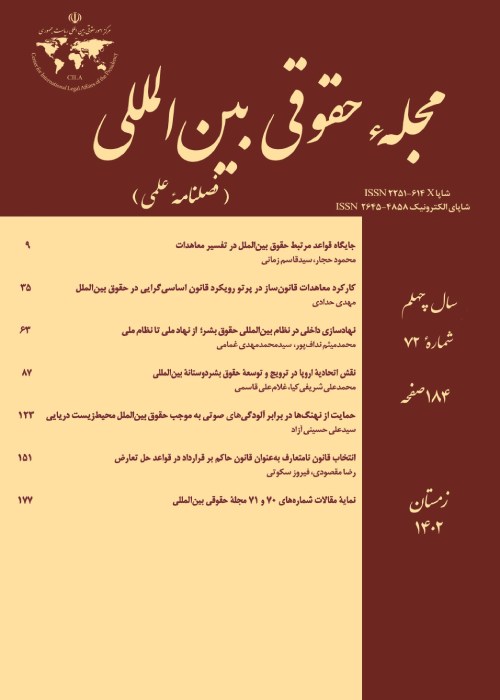Elements of the Crime of Genocide in the Jurisprudence of the International Court of Justice and Ad Hoc International Criminal Courts
Author(s):
Abstract:
On 26 February 2007, The International Court of Justice issued it's judgment on the Application of the Convention on the Prevention and Punishment of the Crime of Genocide (Bosnia and Herzegovina v. Serbia and Montenegro).The Court finds that Serbia has not committed genocide, through its organs or persons whose acts engage its responsibility under customary international law, in violation of its obligations under the Convention on the Prevention and Punishment of the Crime of Genocide and Serbia has not conspired to commit genocide, nor incited and complicit in genocide the commission of genocide, in violation of its obligations under the Convention on the Prevention and Punishment of the Crime of Genocide.The Court finds, on the other hand, that Serbia has violated the obligation to prevent genocide, under the Convention on the Prevention and Punishment of the Crime of Genocide, in respect of the genocide that occurred in Srebrenica in July 1995; and Serbia has violated its obligations under the Convention on the Prevention and Punishment of the Crime of Genocide by having failed to transfer Ratko Mladić, indicted for genocide and complicity in genocide, for trial by the International Criminal Tribunal for the former Yugoslavia, and thus having failed fully to co-operate with that Tribunal and has violated its obligation to comply with the provisional measures ordered by the Court on 8 April and 13 September 1993 in this case, inasmuch as it failed to take all measures within its power to prevent genocide in Srebrenica in July 1995.Here, we analyze the elements of the crime of Genocide in the above-mentioned judgment of the international court of justice at the comparison with the jurisprudence of the Ad Hoc international criminal courts.We can conclude that the fragmentation of the international judicial courts has not arisen to conflict decisions but those bodies endorsed the earlier decisions of each other. Consequently, there is a consistent jurisprudence on the interpretation of the elements of the crime of Genocide.It is obvious that the consistent jurisprudence can lead to the speed procedure in the trial of the suspected persons of the Genocide especially in the International Criminal Court (ICC).
Language:
Persian
Published:
International Law Review, Volume:24 Issue: 36, 2007
Page:
9
magiran.com/p417489
دانلود و مطالعه متن این مقاله با یکی از روشهای زیر امکان پذیر است:
اشتراک شخصی
با عضویت و پرداخت آنلاین حق اشتراک یکساله به مبلغ 1,390,000ريال میتوانید 70 عنوان مطلب دانلود کنید!
اشتراک سازمانی
به کتابخانه دانشگاه یا محل کار خود پیشنهاد کنید تا اشتراک سازمانی این پایگاه را برای دسترسی نامحدود همه کاربران به متن مطالب تهیه نمایند!
توجه!
- حق عضویت دریافتی صرف حمایت از نشریات عضو و نگهداری، تکمیل و توسعه مگیران میشود.
- پرداخت حق اشتراک و دانلود مقالات اجازه بازنشر آن در سایر رسانههای چاپی و دیجیتال را به کاربر نمیدهد.
In order to view content subscription is required
Personal subscription
Subscribe magiran.com for 70 € euros via PayPal and download 70 articles during a year.
Organization subscription
Please contact us to subscribe your university or library for unlimited access!


